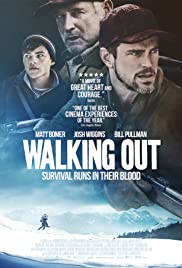
WALKING OUT
US, 2017, 95 minutes, Colour.
Matt Bomer, Josh Wiggins, Bill Pullman, Alex Neustadedter, Lily Gladstone.
Directed by Alex Smith, Andrew J.Smith.
The title is to be taken very literally – not a walking out on someone or some difficult situation but rather a frontier story, people trapped in the wilds of nature, and having to walk out for survival.
The setting for this frontier film is the state of Montana, the Rockies and its mountains, the snow and ice, and the billboard at the local airport proclaiming that this is ‘Big Sky’ country.
A 14-year-old boy is on a small plane, with his phone playing computer games, of course, coming up from Texas where he lives with his mother to have an annual holiday with his father who works as a hunter in the region. Josh Wiggins gives a convincing performance as the boy, David.
His father, Cal, is played by Matt Bomer (who doesn’t look and seem quite ruggedly grizzled enough to have grown-up in the area and to be hunter in such terrain).
Clearly, this is going to be a film about father-son-son bonding, the 14-year-old rather unwilling (and having to give up his computer game playing), the father loving but demanding. David is to shoot his first moose. The boy is not such a good shot and, even practising shooting birds, misses more than hits.
This is even more than a father-son relationship film because there are continuous flashbacks throughout the film to Cal and his father, Clyde (Bill Pullman). Cal remembers being a little boy with his father but also as a 14-year-old and, eventually, revealing his own experience in shooting at a moose.
It has to be said that the scenic photography is beautiful, even when it is threatening.
Cal is very careful, noting tracks, instructing his son, confrontation with an elk, coming across a grizzly bear, later finding some wounded cubs. There are talks – and there is a moose (as well as carefree and callous tourists who just shoot for the sake of shooting and leave carcasses around, a contrast with Cal and his believing that hunting is for meat and supply).
Since the title indicates walking out, we know that there will be some difficulties encountered and, at times, these are graphic. In fact, the walking out aspect of the film is very visceral, endurance for father and son which makes some endurance demands on the attention of the audience.
The experience is the making of the boy, not as we might have expected at the beginning, but the boy helping his father, appreciating his father more, which means that in future father-son relationships, David will have much to hand on to his son.
The directors of the film, Alex and Andrew J. Smith, are originally from England but clearly have made their home in Montana.
1. Wilderness story? Montana? The plains, the mountains, the huts? The musical score?
2. The title, expectations, the going in, the experience in the wilderness, walking out?
3. The impact of the train, the opening, Montana, the helicopter scenes of the mountains? The Big Sky area? The plains, the ascent, the trees and streams, the track, the snow and the weather? Audience expectations?
4. David, in the plane, computer games, his estranged father, his relationship with his mother? Visiting his father annually? Waiting at the airport, his father’s arrival in the snow? The house, their talk, closeness of the bed, no phone, no games? His expectations, the hunting, 14?
5. Cal, his age, his experience of Montana? His love for David? The annual visits, hunting, his life in the wilderness, expectations? For David to shoot his first moose? His demands? Love and bonds?
6. The portrait of Clyde, appearing in the flashbacks, his age and experience, his wife, her dying of cancer? Hunter, Cal at 14, shooting the birds, shooting at the moose, missing, its going into the river, floating, Cal shooting it? His father’s reaction, against killing for killing’s sake? The discussions, his father helping him? Fly fishing in the rods? Clyde’s character?
7. The hunt, for meat, not for mere hunting’s sake? Tourists and their massacring animals and leaving them? The bears, elk, deer, moose?
8. David and his relationship with his father, going to the hunt, wary, the shooting of the birds, his missing? The elk? His changing his attitude, wanting to measure up, this standard of his father and grandfather? Sharing with his father, the closeness at night, his father turning off the phone? The car, the tracker, the track?
9. The talk about bears, the encounter with the bear? The dead moose? Shooting the elk, carving the meat?
10. The crisis situation with the bear, the wounded cubs? David getting the water, being bitten by the cub? Climbing the tree, the gun, the safety-catch off, the accidental shot, wounding his father’s leg?
11. The trek, the endurance, the visual experience of the characters, the audience? Dragging his father, treating his wound, stanching the blood? Fires, food, raw meat, cooking, getting the grouse, masticating the food for his father? The decision to carry him? The landmarks, being lost? Getting his father to talk, telling the story of his being 14, killing the moose, his father’s reaction?
12. Coming to the barbed wire, the girl in the house, the getting help, the doctor, declaring his father dead? Knowing that his father had died but wanting to carry him?
13. David, the experience, his future, the heritage of his grandfather, his father – and something to hand on to his own son?